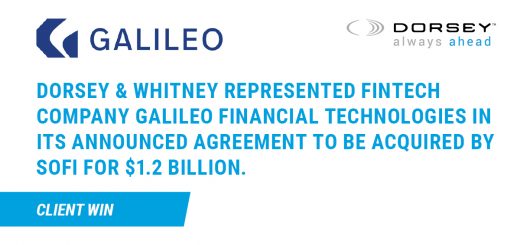Category: Practice Pointers
By now, probably everyone that works in M&A or private equity has heard of the concept of a locked box as an alternative to completion accounts (or, in the U.S., “closing accounts”) on a deal. The locked box structure replaces the traditional “completion accounts” mechanism, with its cumbersome process of preparing and agreeing accounts as at the actual completion date and making consideration adjustment payments to reflect any surplus or deficit in the chosen financial metrics, with one where the...
On January 25, Dorsey attorneys, Brian Burke, Amelia Messa and Jonathan Van Horn presented a review of corporate, alternative entity and antitrust law developments of interest to the M&A practitioner, including the latest Delaware court decisions. Highlights from this presentation include discussion on appraisal rights, fraud, SPACs, non-competition agreements, choice of law, change in control provisions and personal jurisdiction. Watch the presentation here.
Dorsey has recently published a 2023 Private Funds Compliance Calendar. The calendar includes obligations and deadlines that could potentially apply to an SEC-registered investment adviser, or CFTC-registered commodity pool operator, or a commodity trading advisor that advises private funds. The calendar is available here.
Often, when a buyer purchases a specific business unit of a company, complexities arise for both buyer and seller as the business unit being sold frequently depends upon several services provided by the seller. At the time of closing, the buyer may not have the infrastructure, resources, or functionality to initially support these services. Transition services agreements (“TSAs”, for short) are effective tools in addressing these issues and can help ensure a smooth transition during the divestiture. A TSA is...
In a deal market as uncertain as this one, we have seen transactional lawyers more frequently resorting to pushing what are known as “hell or high water” clauses—clauses that obligate parties to take “any and all actions necessary” to achieve some stated goal. Most frequently these clauses are seen in the context of complying with antitrust laws and obtaining necessary regulatory approvals. As antitrust matters take the spotlight in a number of cases, especially given the Department of Justice’s and...
A major law firm has completed a survey on trends and deal points in the M&A industry. The survey contains data and trends on many key points the M&A legal practitioner should be aware of as they negotiate M&A transactions, and the findings in the summary mirror our own experience in the market. In general in more recent transactions we have seen a continuing trend lower escrowed indemnity amounts, higher usage of representation and warranty (“R&W”) insurance, and generally more...
Dorsey recently advised fintech company Galileo Financial Technologies, Inc. (Galileo) in connection with its announced agreement to be acquired by Social Finance, Inc. (SoFi) for $1.2 billion. “I am honored to have led a terrific Dorsey team of more than 20 attorneys and paralegals in helping our client Galileo Financial Technologies in achieving this significant milestone,” said Dorsey Partner Nolan Taylor. “This transaction showcases Dorsey’s ability to bring a world-class deal team together to complete a major transaction. Our team’s...
The current macro and micro dynamics in the food and ag sector are rapidly shifting and uncertain, particularly in today’s world of the coronavirus. From a changing regulation and political environment to generational succession planning challenges, change and unknowns are creating both challenges and opportunities. As a result, consolidation in the food and ag sector is occurring at an unprecedented rate. On March 25, 2020 Dorsey partner Michael Droke presented a webinar addressing the impacts of Coronavirus/COVID-19 on the M&A...
The fiduciary duty of care has become more aspirational than a real legal basis for potential director liability in M&A in the Age of DGCL Section 102(b)(7), Corwin v. KKR Financial Holdings LLC (Del. 2015) and In re Volcano Corp. Stockholders Litigation (Del. Ch. 2016). At the 32nd Annual Tulane Corporate Law Institute in New Orleans on Thursday and Friday, March 5 and 6, 2020, a panel led by former Delaware Chief Justice Leo Strine (and including former Delaware Supreme...
Directors and officers of corporations owe a duty of care and a duty of loyalty to both the corporation and its shareholders, although the duty of care for directors can be exculpated. A breach of these fiduciary duties can expose such directors and officers to liability. In Morrison v. Berry, No. 12808-VCG, 2019 Del. Ch. LEXIS 1412 (Ch. Dec. 31, 2019), a recent decision published by the Delaware Chancery Court, Vice Chancellor Glasscock granted motions to dismiss against the majority...
Care must be taken when a U.S. entity spins off assets to a newly formed wholly-owned subsidiary so that the legal protections offered by the desired separation are realized. This article presents a few high-level issues to consider. Fraudulent Conveyance Risks Associated with the Separation. A conveyance would be deemed fraudulent by a court of law if a company transfers assets for less than reasonably equivalent value while the company was insolvent. A board of directors cannot approve a spin-off...
Acquisitions of companies, especially target companies with international operations, require buyers to carefully scrutinize the target’s compliance programs, including the target’s compliance with the U.S. Foreign Corrupt Practices Act and other anti-bribery and anti-corruption laws. Doing so enables the buyer to more accurately assess the target’s value and risk profile, negotiate for the costs of any misconduct to be borne by the sellers and evaluate whether remedial steps are needed. When designing and executing a pre-M&A due diligence process on...
The recent saga of WeWork—a stylish co-working concept—provides a stark reminder of the importance of adhering to proven corporate governance principals. The corporate form as a means of funding an enterprise works very well when the owners elect a board, the board hires and oversees management, and management adheres to metric-based goals. However, when a cult of personality grows around a founder who believes he or she always knows best, paired with hands-off investors and a passive board, the governance...
As of December 31, 2021 (the “Effective Date”), the use of LIBOR as an index for commercial and consumer loans will likely cease—which presents lenders and other industry participants with the challenges to address: (a) the process for replacing LIBOR as an index for commercial and consumer loans outstanding as of the Effective Date that employ LIBOR as an index; and (b) how to proactively anticipate the end of LIBOR by beginning to substitute a new index for LIBOR between...
Nearly every M&A transaction begins with a look at the possibilities: the strategic fit; the synergies; the drivers for the deal. Naturally enough, the next step will turn to an evaluation of risk. Traditionally, legal exposure from toxic tort and other forms of product liability has rated high on the list of issues to identify and protect against — up there with environmental liabilities and compliance exposures. Recently, however, eye-popping damage awards have raised the stakes, suggesting that acquirers may...









